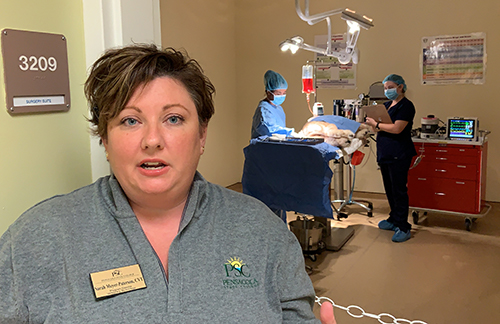By Mike Suchcicki, Pensacola State College
The animal on the operating table clearly was artificial, basically a large stuffed dog, but the two students, in surgical masks, scrubs and gowns, forbade entry into the room.
“We’re maintaining the sterile zone,” one of the students said, politely shooing away a visitor before returning to her task of preparing the faux canine for surgery.
Now that’s professionalism.
The students of PSC’s veterinary technology program eagerly welcomed the public into the environment of their chosen vocation during an open house on Nov. 13 in Building 3200 of the Warrington campus.
If the open house reminded visitors of their local veterinary hospital, well, that’s the point.
“Our facility was actually designed to resemble an operational veterinary hospital, so we have all of the modalities and technologies that most modern hospitals have,” said Sarah Meyer-Paterson, program director of veterinary technology. “The students learn the different modalities, such pharmacology, diagnostic imaging, analog and digital radiography, ultrasonography, anesthesia, surgical assistance, laboratory diagnostics, anatomy physiology, behavior, just on and on and on.”
The various stations throughout the open house were designed as interactive displays, challenging visitors with questions (“How many teeth should an adult dog have?”) and challenges (“Can you locate each of the bones on the horse, dog and cat?”) and inviting them to participate in simple lab procedures, such as examining items through a microscope.
Carmen McCray, a second-year veterinary technology student, demonstrated various dental diagnostic and cleaning techniques. Another second-year, Haley Harris, gave visitors a tour of a bi-level cage housing two rats, Darwin and Taffy. Of special interest to visitors was second-year-student Colbey Therrell, who was draped with Daisy, a 9-year-old boa.
“Believe it or not, there are a lot of people out there who own these guys, so it’s important for us to learn how to properly care for them,” Therrell said.
The program uses a variety of interesting teaching tools, such as a life-size, ultra-realistic, artificial horse’s head, mounted on a stand at the animal’s proper height, allowing students to learn the proper way to approach, touch and examine the horse before dealing with the real, often-intimidating animal. To demonstrate, Meyer-Paterson fitted a bridle upon the artificial horse’s head.
“Our facility is set up to be self-sustaining,” Meyer-Paterson said. “So we actually have a cat ward and a dog ward, and those animals come to us from the Santa Rosa County and Escambia County animal shelters. They come to us on a Monday, we use them in our live-animal skills laboratory courses and the students work with them depending on what the current course is, and then the animals go back to the shelter. This fall semester we anesthetized them and we cleaned their teeth; we also do full-mouth radiography, and so those animals get dental care that they may not have gotten otherwise, so when they go back to the shelter it actually makes them more adoptable.”
Also at the open house were some of the program’s success stories, including Courtney Green, a certified veterinary technician currently working at Animal Hospital of Pensacola.
“I actually worked there before I went to school here,” Green said. “But I wanted to further my education and earn credentials.” She said that the five-semester, two-year associate degree qualifies the student to take the national certification exam to become a CVT.
One of the goals of the open house was to demonstrate that the PSC veterinary technology program is valuable not only to the students but also to the public at large, according to Dr. Mitzie Sowell, head of the PSC Allied Health Department.
“Obviously we have animals and we want to make sure those animals are cared for,” Sowell said. “So it’s important to have certified individuals in veterinary facilities that can aid those animals. It makes you that much more confident to be able to take your animals in and have someone take care for them when you know they’re coming from qualified institutions like this one.”
It’s not too late to register for Spring Semester. Classes start Jan. 8, 2020. To learn more about PSC’s Veterinary Technology program, go to http://www.pensacolastate.edu/academic-programs/vet-as/.
PSC veterinary technician students invite public to their labs, classrooms
The PSC veterinary technology program at the Warrington campus showed off its teaching environment, as well as some of its furry and scaly friends, to the public at a recent open house. It's not too late to register for Spring Semester. Classes start Jan. 8, 2020. To learn more about PSC's Veterinary Technology program, go to http://www.pensacolastate.edu/academic-programs/vet-as/
Posted by Pensacola State College on Friday, November 15, 2019

 PirateQ
PirateQ 
